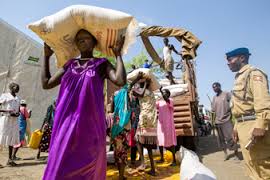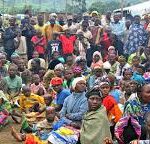By Joseph Mazige
Four recent contributions to the United Nations World Food Programme (WFP) totalling nearly US$30 million will enable the agency assist 400.000 refugees in Uganda to receive food assistance.
Support from the European Commission’s Humanitarian Aid and Civil Protection Department (ECHO), Japan and the United States of America, as well as the United Nations Emergency Response Fund (UN CERF) will allow WFP – working in close partnership with UNHCR – to continue assisting the refugees who depend on international support.
“This funding will enable WFP to continue providing food, cash and life-saving nutrition support for a record number of refugees over the next three to four months,” said Michael Dunford, WFP’s Country Director for Uganda. “WFP is extremely grateful to all the donors for providing such generous funds early in the year, helping us to meet the needs of the refugees efficiently and effectively,” he added.
According to Mr Dunford, the money will be used to purchase food on the local and regional market, for treatment of moderate acute malnutrition among young children, pregnant women and new mothers.
While the substantial funding from these four donors allows WFP to continue its support for an unprecedented number of refugees, an additional US$10 million is still needed to sustain that assistance for the next six months.
The refugee population in Uganda – already the largest the country has ever hosted – continues to grow amid ongoing crises in several neighbouring countries. In January alone, nearly 12,000 refugees arrived from South Sudan, and more refugees continue to arrive daily from Burundi and the Democratic Republic of Congo.
Uganda now hosts approximately 520,000 refugees, the majority of whom have arrived in the past several years and depend heavily on humanitarian assistance from agencies such as WFP.
In February and March, WFP received contributions to support refugee assistance in Uganda: US$2.2 million from ECHO, US$3.5 million from Japan, US$5.5 million from the UN CERF, and US$18.4 million from the United States.
WFP offers a choice between food and cash for refugees who have been in the country longer and are thus better able to support themselves, and who are living in settlements with functioning markets. This is the case in Adjumani, Rhino Camp, Lobule, Kiryandongo, Kyaka II and Kyangwali and Rwamwanja. Providing cash allows families the flexibility to meet their food needs, buy fresh foods and diversify their diets. A key component of food security is people’s ability to choose their preferred food items.
ECHO has prioritised cash distributions within its contribution. This year, for the first time, WFP will exceed 50,000 cash recipients amongst the refugee population.
Under its progressive policy, the Government of Uganda allocates land for refugee families, empowering them to sustain livelihoods and foster integration into Ugandan communities.
Some of the funding from Japan will support refugees and host communities to boost their agricultural earnings and self-reliance through a joint livelihoods programme developed by WFP, the Office of the Prime Minister (OPM) and UNHCR. The joint programme encourages peaceful co-existence between refugees and host populations, and has been developed in line with OPM’s Settlement Transformation Agenda – a component of the second National Development Plan. WFP, OPM and UNHCR are implementing this programme among longer-term refugees in Kyangwali and Rwamwanja and the surrounding host communities.
WFP will work with the Japan International Cooperation Agency (JICA) to complement JICA’s New Rice for Africa (NERICA) project with specialized trainings and infrastructure such as community grain stores, warehouses and household storage equipment.








